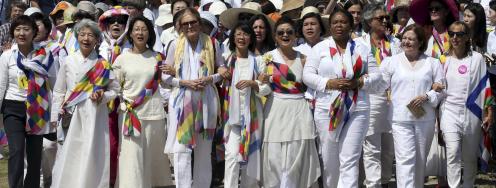How to Unwrap North Korea
December is usually a time to look forward to surprises. The year’s end, holiday events and gift giving are a time to reflect, appreciate and look forward to what the New Year may bring.
But there is one surprise I’d rather not have – wondering what North Korea might do next.
The United States considers North Korea a serious threat, as well it should, because of its rudimentary but demonstrated nuclear weapons capability. This capability has implications not only for the immediate region and stalwart U.S. allies like South Korea and Japan, but risks fissile material or key bomb making technology being sold to other countries or non-state actors. The approach Washington has taken to address this threat over the past several years has been anything but effective. To be fair, it isn’t easy to deal with Pyongyang, and setbacks and frustration should be assumed as part of any diplomatic engagement. But the alternative to engagement is decidedly worse – utter ignorance of what is going on inside the country, on both technical and political fronts; the continued and inexorable march of North Korea to better and more nuclear weapons and missile; and the increased possibility of potential conflict if we try to stop the North’s activities.
American media and the public are captivated by the seemingly bizarre and anachronistic behavior of the “Hermit Kingdom.” The occasional detention of U.S. citizens, the intrigue of high-level purges and leadership “turmoil,” and of course the spotty rocket launches or nuclear tests that Pyongyang conducts as part of its nuclear weapons program. These make for attractive headlines and easy pot-shots at a opaque society and its brutal government. North Korea is a serious threat to the region and nonproliferation – one that will only increase in time absent effective intervention. This threat demands that we look past the freak show mentality we apply to Pyongyang and, as former Secretary of Defense Bill Perry says, “deal with North Korea as it is, not as we wish it to be.”
Next week may likely be another episode in this predictable pattern. Tuesday marks the second anniversary of Kim Jong Il’s death. This noteworthy date comes just after the highest profile consolidation of power by his young son, Kim Jong Un, since he ascended into power. The public arrest and denunciation of Jang Song Thaek, the young Kim’s uncle and protector of his power, has North Korea watcher’s scrambling to assess the meaning and implications of the move – some see it as an expected transition to Kim as his own man – North Korean style; others see an embattled dictator in a court of intrigue ready to create another international diversion, Is it possible that Kim Jong Un may decide to mark the occasion of his father’s death with something more provocative than a parade – who knows?
But this is exactly the point. The United States, China and others for that matter, can no longer afford to guess at what may come next from Kim Jong Un. By refusing to talk with and probe Pyongyang, we also blind ourselves to its intentions and behavior. Under such a cloud, unexpected surprises will happen, and the risks of miscalculation are too great – unintentional wars have started this way. To be sure, the sanctions under UN and other auspices are warranted – Pyongyang has violated many commitments under the Nonproliferation Treaty (NPT) and other international laws and resolutions. In spite of these violations, the U.S. has taken a markedly passive diplomatic approach with the “strategic patience” policy keeping North Korea at arms-length.
The U.S. needs to be tough with North Korea to be sure. But sanctions are not effective without some off-ramp and the prospect of relief from them. The United States needs to resuscitate a dual-track with the DPRK where the sanctions are complemented with opportunities for a negotiated process where the North’s programs and activities are reeled in and measured relief is attainable. No one is saying this will be easy. In fact, we can bet on disappointment and setbacks. That is the nature of diplomacy – keeping our eye on the ultimate goal of a denuclearized North Korea and having the stomach and persistence to see the dialogue through. North Korea is one holiday surprise we need to – and can – begin to avoid.




